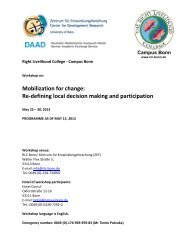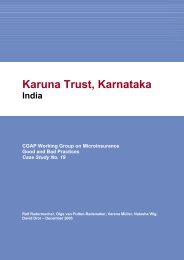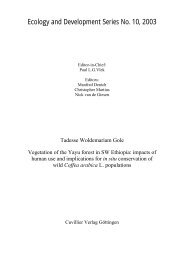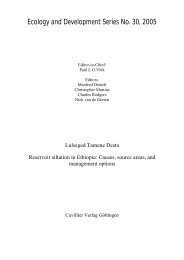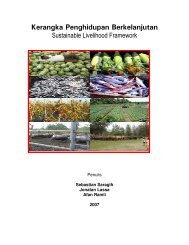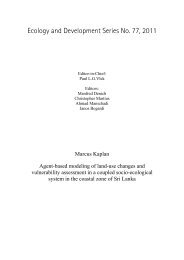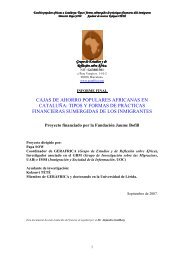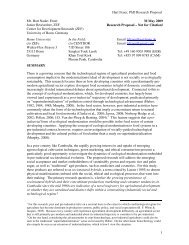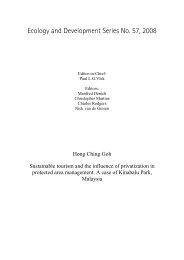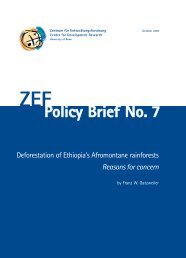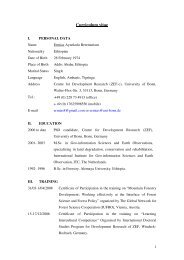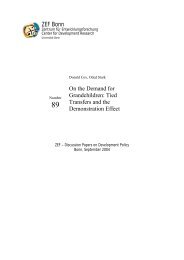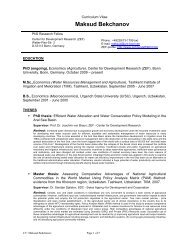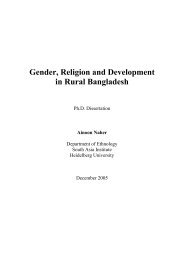ZEF Bonn
ZEF Bonn
ZEF Bonn
Create successful ePaper yourself
Turn your PDF publications into a flip-book with our unique Google optimized e-Paper software.
54<br />
<strong>ZEF</strong> <strong>Bonn</strong> ● Center for Development Research – Annual Report 2001/2002<br />
<strong>ZEF</strong>'s terrestrial ecosystem<br />
research program focuses on<br />
change processes in two areas:<br />
at the ecosystem edge where<br />
land conversion is taking place,<br />
such as forest and desert margins,<br />
and in areas where landuse<br />
practices are leading to<br />
land degradation.<br />
3. Department of Ecology and Natural Resource<br />
Management<br />
The depletion of raw materials, shifts in material and energy flows, degradation of<br />
biodiversity, and landscape changes are exerting a critical strain on the global environment.<br />
Understanding these changes is not only a major challenge for science,<br />
but also a prerequisite for designing policies and actions to alter the course of<br />
events or temper their effects.<br />
Within <strong>ZEF</strong>'s terrestrial ecosystem research program, change processes require attention<br />
in two areas: at the ecosystem edge where land conversion is taking place in<br />
areas such as forest margins, wetland margins, and desert margins, and in areas<br />
where land-use practices are leading to land degradation, and ultimately to the need<br />
for new land. The principal units of analysis range from plot to watershed level.<br />
An important aim of an integrated landscape analysis involving all components (soil,<br />
air, water, plants, animals and human use) is the valuation of services provided by<br />
natural ecosystem components. These special ecosystem values must also be put in<br />
the context of agricultural productivity and trade (or substitution) options, particularly<br />
when societal resources are called upon to improve sustainability or preserve<br />
ecosystem function.<br />
3.1 Atmosphere and Water Management<br />
3.1.1 Carbon cycling and greenhouse gas emissions<br />
Human-induced changes in natural systems or land use have a direct impact on the<br />
atmosphere. Processes such as emissions of CO2, methane and nitrous oxide from<br />
soils or from biomass burning remain poorly understood.<br />
Wetlands store a huge amount of carbon in the soil and cover vast areas worldwide.<br />
Their destruction would lead to an additional input of CO2 into the atmosphere.<br />
Wetlands are also important centres of diversity for both flora and fauna and<br />
regulate the water balance in the landscape. Sound concepts for a wise use of wetlands<br />
are needed to comply both with the Ramsar Convention in favour of nature<br />
conservation and the UN Framework Convention on Climate Change to forestall<br />
emission of greenhouse gases.<br />
<strong>ZEF</strong> is working towards a better understanding of land-use change in wetlands as<br />
well as development options that offer environmentally and economically viable<br />
alternatives. It has therefore elaborated a new research program on wetland development.<br />
An initial study compiles a global inventory of wetlands and their carbon<br />
pools based on vegetation and soil maps. This inventory will assist in identifying the<br />
stocks of soil organic carbon and their density distributions in the global wetlands<br />
and thus the hotspots of potential greenhouse gas (GHG) emissions under ongoing<br />
development.<br />
The global inventory is supplemented by in-depth studies on land-use change on<br />
regional scales. One case study on wetlands in the Lake Victoria Basin has been<br />
initiated in collaboration with the International Centre for Research in Agroforestry<br />
(ICRAF). Carbon dioxide emissions involved in land use change will be quantified in<br />
two steps: first by an analysis of remote sensing images and then by a characterisa-



